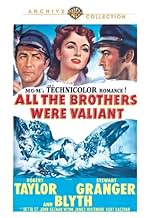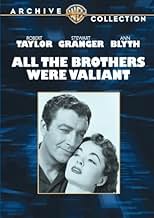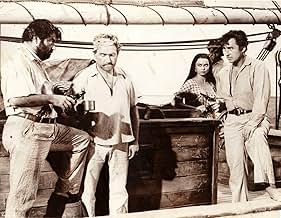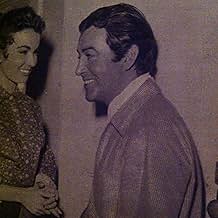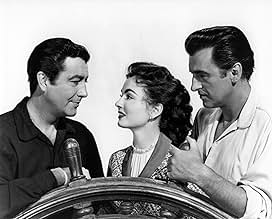NOTE IMDb
6,2/10
1,2 k
MA NOTE
Dans les eaux des mers du Sud, Joel et Mark Shore, deux frères qu'une rivalité sur fond de perles précieuses a séparés, se retrouvent pour défaire un équipage mutiné.Dans les eaux des mers du Sud, Joel et Mark Shore, deux frères qu'une rivalité sur fond de perles précieuses a séparés, se retrouvent pour défaire un équipage mutiné.Dans les eaux des mers du Sud, Joel et Mark Shore, deux frères qu'une rivalité sur fond de perles précieuses a séparés, se retrouvent pour défaire un équipage mutiné.
- Réalisation
- Scénario
- Casting principal
- Nommé pour 1 Oscar
- 1 nomination au total
Frank DeKova
- Stevenson
- (as Frank deKova)
Avis à la une
Taylor is captain of a whaling ship in the south Pacific. His wife, Anne Blythe, is also aboard to keep Taylor from getting too nervous. The crew are a mixed lot. Somewhere along the way Taylor's ship picks up Taylor's brother, Stewart Granger, who left home long ago to pursue various unsavory adventures, leaving behind a history of family friction.
Granger relates a tale of falling in with a couple of douche bags, Kurt Kaszner and James Whitmore, who show him a stash of pearls in the lagoon of an island inhabited by hostile natives. Before they can make off with the millions of dollars of rare pearls, the two miscreants are killed and Granger barely escapes alive.
Back aboard Taylor's ship, Granger invites him to forget about any past frictions and join him in getting the pearls. Forget the whaling business. It sounds pretty good to Anne Blythe, who has always had a bit of a crush on the roguish Granger, but Taylor's face is grim as he declares that he, the captain, will carry out the ship's mission, which is to kill whales.
Stewart seduces Blythe and incites a mutiny. That's the kind of guy he is. There is a knockabout fist fight, and Granger changes sides to fight side by side with his brother and -- well, medical discretion forbids the revelation of additional plot details, but, this being a 1950s movie, you can guess the ending.
Interesting to see Stewart Granger in the role of irresponsible and light-hearted adventurer, kind of an Errol Flynn role. Robert Taylor's acting makes a quantum leap in this film -- he manages to suggest two emotions at the same time. As an actress, Anne Blythe had a pretty voice.
The score is by Miklos Rozsa. You can tell from the moment that first signature six-note phrase appears. We're told Rozsa was a musical prodigy. There's no reason to doubt it, but he recycled the same tone and even the same melodies from one movie to the next. Dmitri Tiomkin was also distinctive, but you can tell one score from another. "The Guns of Navarron" doesn't sound like "Red River." But here, if you close your eyelids, you find you're watching "Ben Hur" unroll on their interiors.
I hate to sound too sarcastic about this but it really is a dated by-product of the old Hollywood. It seems to have been ground out like a Sonic Burger. Everyone wears clean clothes. The men are closely shaved except those who look like supporting players and extras who have been instructed to grow beards so they look villainous. The tans are not from the weather but from Max Factor. After a monstrous gut-busting fist fight, nobody has a mark on him -- and this was after "Shane". The scenes aboard ship are studio bound. There's not a puff of wind.
Strictly routine.
Granger relates a tale of falling in with a couple of douche bags, Kurt Kaszner and James Whitmore, who show him a stash of pearls in the lagoon of an island inhabited by hostile natives. Before they can make off with the millions of dollars of rare pearls, the two miscreants are killed and Granger barely escapes alive.
Back aboard Taylor's ship, Granger invites him to forget about any past frictions and join him in getting the pearls. Forget the whaling business. It sounds pretty good to Anne Blythe, who has always had a bit of a crush on the roguish Granger, but Taylor's face is grim as he declares that he, the captain, will carry out the ship's mission, which is to kill whales.
Stewart seduces Blythe and incites a mutiny. That's the kind of guy he is. There is a knockabout fist fight, and Granger changes sides to fight side by side with his brother and -- well, medical discretion forbids the revelation of additional plot details, but, this being a 1950s movie, you can guess the ending.
Interesting to see Stewart Granger in the role of irresponsible and light-hearted adventurer, kind of an Errol Flynn role. Robert Taylor's acting makes a quantum leap in this film -- he manages to suggest two emotions at the same time. As an actress, Anne Blythe had a pretty voice.
The score is by Miklos Rozsa. You can tell from the moment that first signature six-note phrase appears. We're told Rozsa was a musical prodigy. There's no reason to doubt it, but he recycled the same tone and even the same melodies from one movie to the next. Dmitri Tiomkin was also distinctive, but you can tell one score from another. "The Guns of Navarron" doesn't sound like "Red River." But here, if you close your eyelids, you find you're watching "Ben Hur" unroll on their interiors.
I hate to sound too sarcastic about this but it really is a dated by-product of the old Hollywood. It seems to have been ground out like a Sonic Burger. Everyone wears clean clothes. The men are closely shaved except those who look like supporting players and extras who have been instructed to grow beards so they look villainous. The tans are not from the weather but from Max Factor. After a monstrous gut-busting fist fight, nobody has a mark on him -- and this was after "Shane". The scenes aboard ship are studio bound. There's not a puff of wind.
Strictly routine.
Brothers on a whaling schooner become romantic rivals. In the South Pacific islands, two brothers, one good and one bad, fight over the same girl and over a bag of pearls. Directed by Richard Thorpe, stars Robert Taylor, Stewart Granger and Ann Blyth. The music score is by Miklós Rózsa. This 1953 film is a remake of the 1923 silent film that starred Lon Chaney, made by Metro Pictures. Thorpe, who by the way was the original director of The Wizard of Oz, enjoyed a long career at MGM. He directed a variety of ¨A¨ productions like Two Girls and a Sailor, White Cargo, Ivanhoe (probably his best), Knights of the around Table to name just a few. He used to be a good craftsman.
Based upon the novel by Ben Ames Williams who died the year it was released this is produced by crowd pleaser Pandro S. Berman and directed by Richard 'one-take' Thorpe.
MGM stalwart Robert Taylor is lumbered with the part of the good brother whilst Stewart Granger has by far the most interesting role as his villainous sibling. Ann Blyth, replacing Elizabeth Taylor, is the meat in the sandwich. This proved to the last film alas of veteran Lewis Stone. Ravishing Betta St. John plays her customary 'exotic' role. Keenan Wynn and James Whitmore were to enjoy long careers and teamed up that year to steal the show as Lippy and Slug with their priceless rendition of 'Brush up your Shakespeare'.
George Folsey was again Oscar-nominated for his superlative cinematography but again missed out and the score by Miklos Rosza is suitably stirring.
The whale hunt is well done although obviously filmed in a studio tank and the final fisticuff-fest well choreographed.
Despite its cast and production values it is alas rather plodding and fails to excite. Granger's description of it as a 'crappy melodrama' seems unduly harsh but he was notoriously dismissive of most of his films. This prickly actor parted company with MGM four years later while the more 'accommodating' Robert Taylor continued his thirty-year long association.
It's 1857. Joel Shore (Robert Taylor) returns to New Bedford, Massachusetts after three years at sea. He hears that his brother Mark (Stewart Granger) had gone missing on a whaling ship. There are rumors surrounding the incident and Joel has questions. Joel marries Priscilla Holt (Ann Blyth) and they board the Nathan Ross.
This got an Academy Award nomination for Best Color Cinematography although I don't really like the way the film looks. It may be technically good, but the story requires grime and salty crust. Everything and everyone looks way too crisp. After the initial introduction, there is the flashback section which is a thriller adventure. I like it and almost wouldn't mind that as the movie. The other main section is the paranoia of potential mutiny and that has too much melodramatic acting. Joel would have tried harder to convince Priscilla. For each element that I like, there is some sort of drawback.
This got an Academy Award nomination for Best Color Cinematography although I don't really like the way the film looks. It may be technically good, but the story requires grime and salty crust. Everything and everyone looks way too crisp. After the initial introduction, there is the flashback section which is a thriller adventure. I like it and almost wouldn't mind that as the movie. The other main section is the paranoia of potential mutiny and that has too much melodramatic acting. Joel would have tried harder to convince Priscilla. For each element that I like, there is some sort of drawback.
I have seen this movie several times and discover something new every time. One of the best things about this movie is the flashback sequence with Granger fighting pirates Whitmore and Kasznar for a bag of pearls. The rest of the movie explains how he tries to get his brother [Taylor] to them back from the lagoon where they were lost. You will need to see this movie at least two times before you understand all of the hidden plot twists.
Le saviez-vous
- AnecdotesFinal film of Lewis Stone (Capt. Holt), who died in September 1953, two months before the film was theatrically released.
- GaffesWomen aboard ship were considered bad luck all through the sailing ship days. The superstition even extended part way into the modern era. Crews were known to resist sailing on ship that was to have a woman aboard.
- ConnexionsRemake of Un soir à Singapour (1928)
Meilleurs choix
Connectez-vous pour évaluer et suivre la liste de favoris afin de recevoir des recommandations personnalisées
- How long is All the Brothers Were Valiant?Alimenté par Alexa
Détails
- Date de sortie
- Pays d’origine
- Langue
- Aussi connu sous le nom de
- All the Brothers Were Valiant
- Lieux de tournage
- Société de production
- Voir plus de crédits d'entreprise sur IMDbPro
Box-office
- Budget
- 1 816 000 $US (estimé)
- Montant brut mondial
- 8 168 $US
- Durée
- 1h 35min(95 min)
Contribuer à cette page
Suggérer une modification ou ajouter du contenu manquant


